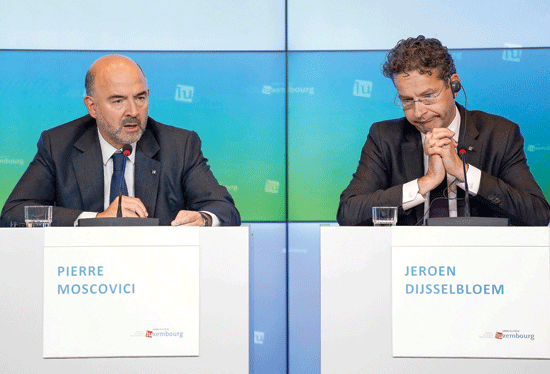

Luxembourg: European Union efforts to build a financial- transactions tax among 11 nations pressed on in a bid to break a deadlock over what to tax and at what rate.
“Important advances were made” at a meeting among participating nations yesetrday in Luxembourg, French Finance Minister Michel Sapin told reporters. He said France continues to push for a wide base and a low rate for the trading levies.
Sapin said ministers agreed to tax gross trades rather than net transactions, which would include high frequency trading. He said the only derivatives exceptions would be those related to sovereign debt sales, and that the tax should be designed so that firms can’t evade levies by relocating.
“We’ve agreed on certain principles and we’ll be able to make more important decisions in October,” Sapin said. “That doesn’t mean we’ve decided all the details or that the financial transaction tax will start in October, but a certain threshold has been passed.”
Sapin said it will take nine months to implement the deal once it’s agreed, and France would like proceeds spent on developing country projects linked to climate change. He declined to estimate how much the tax would raise, saying a goal is to slow financial markets.
Transaction-tax plans have slowed down as countries disagree about how much revenue the tax should raise. Austria and other smaller nations have said it needs to bring in substantial revenue to be worthwhile, while Germany and France have backed a phased-in approach.
Before the meeting, finance ministers were considering redistributing proceeds to compensate states that would have to invest more to collect the tax than they would generate from it, Die Welt newspaper said, citing a planning document for Saturday’s meeting.
Last year, Italy proposed three possible models for shifting revenue from countries where transactions take place to nations where the trading firms are based, so that countries with smaller financial sectors wouldn’t be at a disadvantage. This would allow the tax to be collected in the country of issuance, then allocated to take account of other parameters such as residence.
Since then, participating nations have continued to circle the issue. The 11 nations, who opted to proceed after EU-wide talks fell apart, are Germany, France, Spain, Italy, Belgium, Austria, Portugal, Greece, Estonia, Slovakia and Slovenia.
“We managed to agree on some of the core principles today” and a technical group has a “clear mandate” to work through the remaining points. Austrian Finance Minister Hans Joerg Schelling, who heads the collection of nations, told reporters yesterday.
Bloomberg








